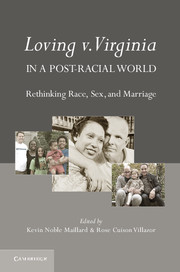Book contents
- Frontmatter
- Contents
- About the Contributors
- Acknowledgments
- Foreword
- Introduction Loving v. Virginia in a Post-Racial World
- Part One Explaining Loving v. Virginia
- Part Two Historical Antecedents to Loving
- Part Three Loving and Interracial Relationships: Contemporary Challenges
- Part Four Considering the Limits of Loving
- Part Five Loving Outside the U.S. Borders
- Part Six Loving and Beyond: Marriage, Intimacy, and Diverse Relationships
- 17 Black v. Gay?
- 18 Beyond the Loving Analogy
- 19 The End of Marriage
- Afterword
- Permission Granted
- Index
- References
17 - Black v. Gay?
Centering LBGT People of Color in Civil-Marriage Debates
Published online by Cambridge University Press: 05 July 2012
- Frontmatter
- Contents
- About the Contributors
- Acknowledgments
- Foreword
- Introduction Loving v. Virginia in a Post-Racial World
- Part One Explaining Loving v. Virginia
- Part Two Historical Antecedents to Loving
- Part Three Loving and Interracial Relationships: Contemporary Challenges
- Part Four Considering the Limits of Loving
- Part Five Loving Outside the U.S. Borders
- Part Six Loving and Beyond: Marriage, Intimacy, and Diverse Relationships
- 17 Black v. Gay?
- 18 Beyond the Loving Analogy
- 19 The End of Marriage
- Afterword
- Permission Granted
- Index
- References
Summary
Loving is a cornerstone of social, political, and legal arguments for, and against, civil marriage rights for same-sex couples. Same-sex marriage-rights advocates assert that restricting marriage to only one man and one woman is similar to barring Whites from marrying non-Whites. Thus, barring two people of the same-sex from marrying violates the proposition that the fundamental right to marry is fully realized only if one can marry a person of her choice. Denying civil marriage rights to same-sex couples constitutes sex and/or sexual orientation discrimination, which parallels the race discrimination found unconstitutional in Loving.
Utilizing this 1967 decision to connect same-sex and interracial marriage has come to be known as the “Loving analogy,” which generates a discussion of same-sex marriage as a civil rights issue. The state determines which relationships, and thus the people in them, may receive the blessings of marriage. Leaving same-sex couples out suggests that they, and lesbian, gay, bisexual, and transgender (LGBT) people in general, lack worth and are excluded from the 1,000-plus benefits, rights, and privileges of marriage. Thus, LGBT communities have strong reasons to fight for access to marriage. Society as a whole benefits if adults in intimate relationships are allowed full access to marriage regardless of their race, sex, gender, or sexual orientation. All subordinated groups, who themselves have been excluded from full marriage rights at different times throughout history, should recognize that there are benefits to accessing marriage for all, even if there is personal disagreement over the purpose and meaning of civil marriage itself.
- Type
- Chapter
- Information
- Loving v. Virginia in a Post-Racial WorldRethinking Race, Sex, and Marriage, pp. 235 - 241Publisher: Cambridge University PressPrint publication year: 2012
References
- 1
- Cited by



